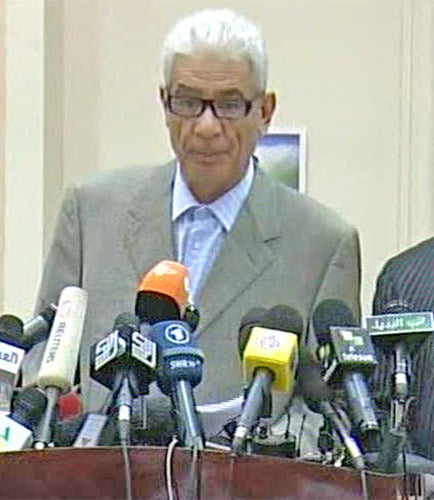Libyan regime insists talk of 'defection' is untrue

The news that Mousa Kousa, Libya's Foreign Minister, had slipped across the border into Tunisia on "private" business was always bound to excite interest.
Speculation that he might have defected was dismissed by the regime yesterday and there are many other good reasons why he might have left the country, for example for discussions with a government critical of Western military intervention – like Russia to name but one.
Mr Kousa has long been one of the fixtures of the Gaddafi regime, sometimes seen as its most influential figure outside the ruling family.
But he is also an enigmatic figure, pugnacious, 20 years an intelligence official with a background of intrigue – and brutal suppression of dissidents. He is also the man blamed for masterminding the 1988 Lockerbie bombing, and credited with the famous rapprochement a decade and a half later in which Libya accepted responsibility to end the regime's international pariah status.
Mr Kousa appeared to have turned full circle. The man who sat in the august surroundings of Pall Mall's Travellers' Club negotiating with MI6 the fine details of Libya's renunciation of weapons of mass destruction had been summarily expelled from London, where he was ambassador 20 years earlier for boldly announcing that the regime intended the execution of two dissidents living in the UK.
He went on to involve himself closely with the IRA, which was then engaged on its bombing campaign. As with the British, so with the Americans. With a master's degree in sociology from the University of Michigan, Kousa has long understood how to talk to US officials.
There is a colourful account in former CIA chief George Tenet's memoirs of the gradual process in the early part of the last decade by which Washington smoked out the commitment to renounce WMD. As NBC's Robert Windrem recounted in a recent profile of Kousa, when the CIA was seeking to close down the international network run by the creator of Pakistan's nuclear weapons programme, AQ Khan, including the sale of centrifuges to Libya, Kousa helped to provide clinching information on the network to the US.
The CIA asked Kousa if he knew anything about another group of Pakistani scientists operating through a "charity" called UTN. "Yes," the Libyan replied. "They tried to sell us a nuclear weapon. Of course, we turned them down."
Certainly Mr Kousa seemed less than his normally comfortable self when he read out his statement announcing a ceasefire the day after the resolution was passed. He refused to take questions from reporters afterwards. And his tone was notably more respectful of the resolution than the bellicose ranting the day before of Colonel Gaddafi.
None of this means that he is one of those the US Secretary of State suggested earlier this month had "reached out" to Western powers for an exit route. He may be much too deeply embedded in the regime for that. But if nothing else Mr Kousa is a big part of how the West was seduced by Libya into a rapprochement in the first place.
Join our commenting forum
Join thought-provoking conversations, follow other Independent readers and see their replies
Comments
Bookmark popover
Removed from bookmarks